Think of this as Volume 17, Number 41 of the newsletter I have written weekly since March, 1997. Enjoy.
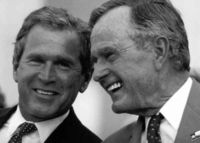
set pattern.
First comes excess. An obsolete
political thesis (a set of myths and values underlying power) causes
the crisis. In this case, it was George W. Bush following the Nixon
Thesis into the ditch of Iraq, Katrina, and the Great Economic Meltdown of
2008.
When anyone questioned him, he just repeated the old mantras,
louder. He knew no other way, any more than Lyndon Johnson, or
Herbert Hoover, or James Buchanan before him. After all, he learned his politics at his daddy's knee, and his father adapted his to those of Ronald Reagan. Who validated Nixon.
It's when Thesis
hardens into ideology and ideology runs into history that America
runs into a brick wall.
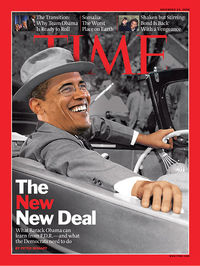
election of Barack Obama was a turning point, just like the 1968
election of Richard Nixon, the 1896 election of William McKinley, or
the elections of Franklin Roosevelt and Abraham Lincoln were turning
points. Note that I put the crisis Presidents considered “failures”
first in that list. There's no certainty about a crisis leader's
success, only the reality of a turn.
Then, of course, you have the crisis
itself.
In the Nixon generation this was Vietnamization and what you
might call the War against the War against the War, the Southern
Strategy that rallied the Silent Majority to Nixon's side and could
have made him a Great President after the 1972 landslide, only he
decided to steal what he had already had and got caught.
In our case, the crisis was begun by
the fight over the Affordable Care Act, or Obamacare. This was the
ground the retreating side decided to fight on, just as the Democrats
of a generation earlier chose to fight over Vietnam, and against the
Cold War.
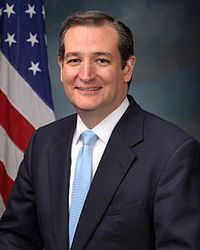
It's a nervous breakdown by the retreating side. And this is a
decisive point, for two reasons. First, because the retreating side
can't help itself, and second because it's decisively rejected by the
new majority.
Why can't Republicans resist Ted Cruz?
Simple. Because he's a demagogue.
There has always been a little bit
of demagoguery at the heart of the Nixon Thesis – remember the
nattering nabobs of negativism? Cruz' political genius has been to
distill all this to its essence, and to deliver it pure to the public
stage. He thinks he's the Hispanic Obama, when he's really just a
domestic version of Joe McCarthy, arguing against the tide at the
height of the New Deal.
What Ted Cruz is selling is the logical
extension of what Republicans have been taught to believe for most of
their lives, the politics they were taught by their parents, who
fought under Nixon-Agnew. That is, the other side consists of evil
people, with evil intent, Communists and Socialists and Fifth
Columnists. An enemies' list. They will destroy America unless we
stand strong, stand now, and not give an inch.

Cruz bubble that his followers are a minority, and a relatively small
one at that, in terms of a nation with over 300 million people in it.
But go online some day, try to engage them in debate, and you'll see
that they make up for their small numbers with incredible passion,
with absolute certainty, and with utter contempt for those who
disagree with them.
This is matched by Cruz' own demagogic skill at
turning every criticism back on the critic. One heckler is ridiculed
as being, well, one heckler. Throw a bunch at him and they're the
“paid operatives” of the President, never mind any lack of
evidence to that effect.
Attack, attack, attack. If you're in
the bubble, it's glorious. If you're outside, it's outrageous, and
dangerous.
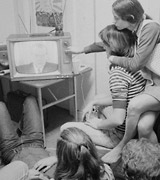
the majority of Americans right now. That he's dangerous, that his
certainty is dangerous, that his supporters are crazy. He is
energizing Obama's Silent Majority in a way that the President
himself never could, by making most of us into his enemy, and by
attacking us as though we were the malignancy and he were the cure.
All of which makes the 2013 Shutdown a
watershed moment in this generation's politics. There's an
assumption, among non-Cruz Republicans, that this is a fever that
will soon pass, that they can use money, deliberate
disenfranchisement, and time to heal the Cruz-inflicted wounds and
maintain the power they have.
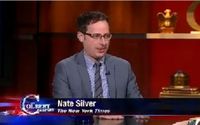
and I believe the polls. While Nate Silver still disagrees,
that's because Nate Silver is young. He's 35. The first President he
remembers is Ronald Reagan, who validated the Nixon Thesis of
Conflict, gave it its gloss, and set the nation on the course it has
followed for most of his life. He is steeped in the Myths of Reagan,
the Values of Reagan, and the Politics of Reagan. He
assumes that the future will be like the past because the future
always has been.
But fundamental change does happen in
America. It happens at a pace which, for mortals like Nate Silver
(and myself) appears glacial. But it does happen, and specifically
because we're mortal. Those who followed the Roosevelt Thesis of
Unity have mostly died-off now. Those who followed the Nixon Thesis of Conflict are aging out. For those practicing what I have called the Obama
Thesis of Consensus, all this is still brand-new, unproven, and
tentative.

ago, by Dr. Gilbert Cuthbertson (right) that MV=P. Myths and Values create power. These myths and values that
are the key to power, what I have dubbed a Thesis, are forged by a
crisis. They're hardened, like concrete, when push comes to shove and
the new majority suddenly discovers that it is, in fact, a majority, a rather substantial one.
What those who followed Nixon did with his majority was
unique in our history. They deliberately whittled it down, exiling
whole groups of people from the Republican Tent, in order to maintain
the fear of “otherness” on which his Thesis rested. Once upon a
time there were pro-choice Republicans, there were moderate and even
liberal Republicans. The majority had to be whittled away so its zeal
could be maintained, and so that zeal could be energized
periodically, the knees jerking each election, regardless of whether
the jerking was in anyone's best interest, because otherwise “they”
will overwhelm "us."
Well, “they” have. And “they”
is us. What will the new Administration do with this power? What will
Barack Obama and (more important) his successor, do to validate,
extend, and enhance this power, to make policy with it?

years, we are going to find that out. The fever is passing, the time
for demagogues fading away.
My own guess is that, based on what I've
called Obama's Thesis, that he will seek broad consensus, reasoned
voices, and the kind of slow, steady progress that was the essence of
progressivism 100 years ago.
But it's not my call to make.
Most
likely, it's Hillary Clinton's. She'd be the same age in 2017 that Reagan was when he took office, and I suspect she'll have the same historical role, that of validating the Obama Thesis of Consensus for a generation.
Some may then call her the greater President, but it's the one who faces the crisis, faces it head-on, with courage and certainty, whom I'll credit.










